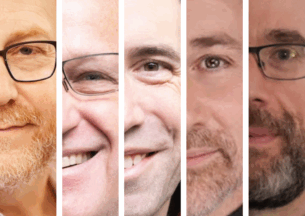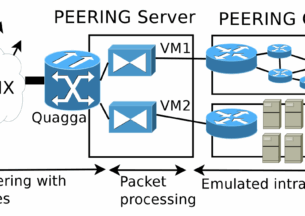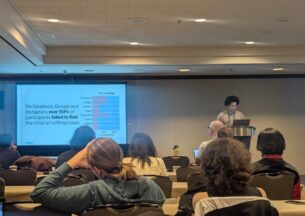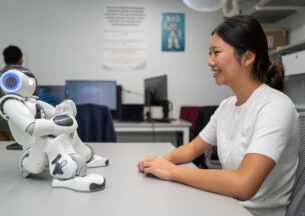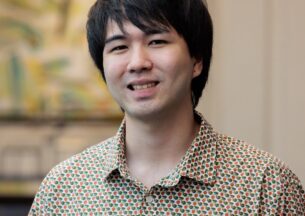Ph.D. Student Shawn Shan Named MIT Technology Review’s 35 Innovators Under 35 and Innovator of the Year
 Written By Claire Fu
Written By Claire Fu
The University of Chicago’s Department of Computer Science is proud to announce that Shawn Shan, a fifth-year PhD student working with Neubauer Professors Ben Zhao and Heather Zheng, is a recipient of the prestigious MIT Technology Review’s 35 Innovators Under 35 (TR35) and Innovator of the Year. TR35 is a peer-reviewed annual award that recognizes outstanding innovators who are younger than 35 across multiple disciplines. Established just last year, the Innovator of the Year award further recognizes one honoree among TR35 for their exceptional contribution to their field and their potential to make an even greater impact on the future. Shan’s recognition in TR35 and Innovator of the Year places him among the world’s most impactful young innovators in artificial intelligence, following in the footsteps of his mentors Zhao and Zheng, who were named on the TR35 in 2006 and 2005, respectively.
“Over the past seven years, the mentorship I’ve received from Ben and Heather has been instrumental in my development as a researcher,” Shan states. “They guided me in identifying meaningful problems, provided invaluable support throughout the process, and, most importantly, equipped me with the skills to navigate complex challenges.”
While many researchers focus on advancing the field of AI beyond its current limitations, Shan has dedicated his career to fighting back against the unethical usage and potential dangers of AI. Having been in Zhao and Zheng’s lab since his undergraduate years, Shan started by building Fawkes, a tool that protects faces from facial recognition technology, in his senior year. More recently as a Ph.D. student, the development of generative AI technology like DALL-E 2, along with an artist who reached out personally, has propelled him to fight back against the exploitation of artists in generating AI images.
“People can go to [the artist’s] website, take ten or twenty images, mimic their style very easily and take their profits,” Shan stated. “A lot of artists we talk to face the dilemma of sharing their data online and risk their style getting scraped by AI. Or they can take the majority of their artwork offline. A lot of artists are doing this, but it significantly impacts how they make money. These days, you make the most out of sharing your art on platforms like Instagram. That’s why we built Glaze.”
With input from over one thousand artists, Shan programmed the algorithm behind Glaze, a tool that masks artists’ personal style from AI mimicry. Glaze computes a set of minimal changes and masks it over the artist’s original work such that it appears unchanged to human eyes, but appears to AI models as a dramatically different art style. Released in March 2023, Glaze has now garnered 3.75 million downloads from artists all around the world. However, Shan and his team quickly found that many artists own limited tech that may not be able to run the Glaze app. They released a web version called WebGlaze shortly thereafter, a free web service that offers an accessible interface for artists to protect their art regardless of the computing platform they use.
Shan did not stop there. Last October, he and his team released Nightshade, which takes artist protection a step further from Glaze by introducing what he calls a “more proactive protection system”. Nightshade doesn’t just prevent an AI model from learning one’s artistic style, but is also able to actively “poison” or confuse the base model. This means that if a company starts training on data that is protected through Nightshade, the AI model itself will begin to degrade over time.
“What we mean by poisoning is, if the model has been trained on data protected by Nightshade, the model could generate a dog image, for example, even if the user asked for a cat,” Shan explained. “We hope that this will incentivize AI companies to not just take data and train their models without asking for consent.”
Nightshade now has just shy of one million downloads, and has garnered interest from photo and media companies. While he was very explicit about Glaze remaining freely available to artists, there is interest in having these media companies support his research and fund further progress for Nightshade.
Shan hopes that Glaze and Nightshade continue to protect the human creativity of artists and other users alike. Whether it is jobs, art, or any other creative outlet, AI is increasingly replacing the minds of people without further innovating and advancing our society in the same way humans can. He urges researchers and people in government to do something now to prevent the art industry, and other creative industries, from getting wiped out by AI before it is too late.
“I feel both a sense of responsibility, but also gratitude towards TR35 for thinking that the type of work I do is important,” Shan reflected. “It is challenging to take a more critical view of AI innovation where most of the current people, money and capital in tech are thrown into AI development. I feel obligated to keep doing the type of work I do, and perhaps inspire younger researchers and other research labs to do this type of work too.”
In the next year, Shan will be looking for a faculty position in academia. He plans to continue to work on improving Glaze and Nightshade, but is also looking into newer projects, such as bridging the gap between data owners and models to promote fair and secure data sharing and licensing between models and owners. He is excited to actively discuss regulatory needs to support these systems with agencies in the US and EU about these policies. To learn more about Shawn’s accomplishments and his work, please visit his website and the SAND Lab website here.


